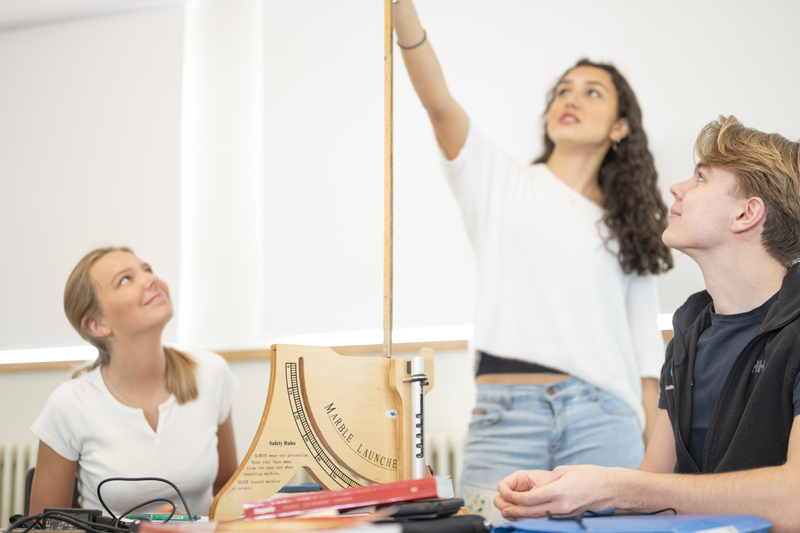About upper secondary school
Engelska (ENG)
Young people who have completed compulsory school can continue their studies in upper secondary school, which is voluntary and free of charge. Upper secondary school offers both vocational programmes and higher education preparatory programmes.

Upper secondary school is intended for individuals between the age of 16 and 20. You can start upper secondary school no later than the spring semester of the year you turn 20. Upper secondary school is voluntary and free of charge.
In upper secondary school, you study subjects such as Swedish, mathematics, English and social studies. You also choose one or more subject areas to specialise in. You will gain a broad knowledge base and develop skills such as problem solving, critical thinking and communication to prepare you for further studies or working life after upper secondary school.
National programmes
There are a total of 18 national upper secondary programmes, including six higher education preparatory programmes and 12 vocational programmes. All of these are three-year programmes.
Higher education preparatory programmes
A higher education preparatory programme prepares you for further studies at a university or university college. Once you have completed the programme, you receive a higher education preparatory diploma.
About higher education preparatory programmes
Vocational programmes
A vocational programme prepares you for a profession. All vocational programmes include at least 15 weeks of APL (workplace-based learning). Once you have completed the programme, you receive a vocational degree. Vocational programmes also provide basic qualification for higher education if you choose to study the levels of the subjects required for basic qualification.
You can also take a vocational programme as an upper secondary apprentice. With this, at least half of the programme takes place at a workplace.
Introductory programme
If you do not qualify for a national programme, there are four introductory programmes available to help you. The introductory programme is intended to prepare you for a national programme or to enable you to find a job.
Which programme you can take depends on factors such as your goals for studying on the programme. An alternative to attending an introductory programme is to spend up to two additional years in compulsory school to qualify for a national programme.
Assessment and learning in upper secondary school
Your teachers will regularly provide you with information on what you have learned in relation to the programme and intended learning outcomes.
Teachers and other pupils can provide feedback to help you progress in your learning. You and your teachers will also discuss how to progress in your studies based on an assessment of what you need and what you already know. It is important that you gain an understanding of your own learning and development needs.
Parent-teacher conferences in upper secondary school
At least once a semester, you, your teacher and your guardian (if you are under the age of 18) meet to discuss how things are going at school and how you are getting on. This is called a parent-teacher conference. The meeting is intended to give you an idea of how your knowledge level has developed and how you are getting on at school.
During the meeting, you will discuss how the school can support and stimulate your development and learning. The meeting gives you and your guardian an opportunity to influence and take responsibility for your schooling.
Grades in upper secondary school
If you are enrolled in a national programme, you will receive a grade after each completed level in a subject. Each subject has set grading criteria which must be met. You will also be graded on your diploma project.
In introductory programmes, the teacher grades you after each completed level in a subject or compulsory education subject.
The grading scale has six levels: A–F. With passing results, a grade between A and E is assigned. With failing results, a grade of F is assigned. If you had so many absences that the teacher cannot assign a grade, a dash will be entered in the grade record.
Subject examination for a grade in upper secondary school
A subject examination means that the school assesses whether your knowledge level is in line with the grading criteria set out in the relevant subject syllabus. After an examination, you will receive a grade in the subject in question.
If you are in upper secondary school, you have the right to conduct a subject examination at your school in
- all subjects
- compulsory education subjects
- the diploma project in your individual study plan.
However, you must not have previously been awarded a grade at that level in the subject, the compulsory education subject or diploma project. Alternatively, you must have received a grade of F.
Subject examination for a grade, skolverket.se
Upper secondary schools can be organised in different ways
There are municipal, independent and county council-run upper secondary schools. All schools are obliged to comply with the Education Act, for example, with regard to the content of the programmes and grading.
Independent schools are open to everyone and the teaching must be on par with that provided in municipal schools. Independent schools are run by a different organiser (owner) than the municipality.